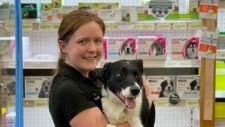SQP Profiles - Ellie Szczerba - Shop Floor Supervisor, Mole Country Stores, Andover

Ellie joined the team at Mole Country Stores
in Andover some three years ago, having honed her passion for animals initially
at a smallholding connected to a village pub she had been working at from
college.
“I was involved in lambing and shearing, and
spent a lot of time working with farmers,” says Ellie. “It was the first time I
had worked with animals, and I wanted to learn more.”
This passion led Ellie to gaining a diploma in
animal management at Sparsholt College in Winchester, before the opportunity to
join the team at Mole Country Stores arose.
“My course was very hands-on, but much more
about animal husbandry and practical animal handling, so when I had the
opportunity to join the team here and learn more about different products and
feeds, and to train towards my RAMA qualification, I jumped at the chance,” she
says.
“The qualification was the most challenging
thing I have ever undertaken, but also my biggest achievement,” adds Ellie, who
is now qualified to supply and prescribe medicines for equine and farm animals,
as well as companion animals.
The training doesn’t stop on qualification, as
it is crucial to stay up to speed with new products and content in the
constantly evolving world of animal healthcare.
However, Ellie says that gaining the trust of
customers is key for her and her team to deliver the right advice, taking into
account a thorough understanding of the animal’s environment and individual
circumstances.
“The qualification is just the start, along
with our on-going CPD training, but the most important part of my role is
developing that understanding, that we are working towards the best outcome for
your loved companion animal,” she says.
When working with companion animals, Ellie
says getting advice right on ectoparasites such as fleas is the most common
issue she handles.
“In the case of dogs, it’s probably fair to
say that only a third of owners use the right product when it comes to fleas,”
she says, “There is no point, for example, just to use a preventative medicine
if your dog is already infected by fleas. The human eye will not necessarily
see the fleas in the environment until six months into infestation.”
This is why Ellie insists her training as a
RAMA, and an understanding of the environment and individual circumstances of
the animal is crucial to ensure she can provide the right advice and prescribe
the most suitable course of treatment.
“If there is an infestation, there is not a
quick fix. As well as identifying the right treatment, we need to look at the
bigger picture, and advise on other measures such as washing bedding, housing
sprays and the general home environment,” says Ellie.
“It is not about adding on costs, it is
essential if we are to get rid of the infestation,” she adds.
Although the summer months are often more
associated with flea treatments, Ellie says it is important to keep up with
flea, tick and wormer programmes throughout the year. However, as we enter the
winter months, and hit frost periods, her advice turns more to general welfare
and care.
Ellie says she has been encouraged by how
increasingly owners are interested to talk about things like animal enrichment,
for example discussing activities or nutrition for a customer’s specific dog or
a specific breed.
“Once again, gaining that understanding and
confidence with the owner, opens up that wider communication for the overall
welfare and care of your companion animal,” says Ellie.
“It helps when I can talk of my own personal experiences
with my two rescue collies, it helps engender that more holistic approach so we
can help keep your companion animal as fit, healthy and happy as possible,” she
concludes.